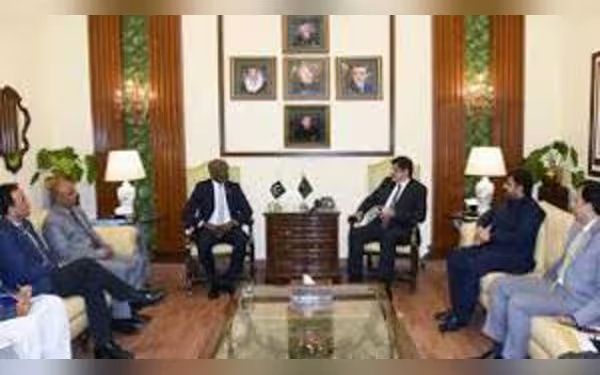Saturday, September 28, 2024 08:20 PM
CM Murad Discusses Climate Change Support with UN Delegation
- Sindh government collaborates with UN on climate initiatives.
- UN commits $4.7 billion for key development areas.
- IMO supports Pakistan's maritime sector development.
 Image Credits: nation_pk
Image Credits: nation_pkCM Murad Ali Shah meets UN delegation to discuss climate change support and sustainable development initiatives in Sindh province.
KARACHI - Climate change is one of the most pressing challenges facing the world today, and Pakistan is no exception. The Sindh province, in particular, has been at the forefront of addressing these environmental issues. Recently, Sindh Chief Minister Syed Murad Ali Shah met with a delegation from the United Nations, led by Resident and Humanitarian Coordinator Mohamed Yahya, to discuss ongoing and future support to tackle the challenges posed by climate change.
During their meeting at the Chief Minister's House, both parties acknowledged the importance of collaboration between the provincial government and the UN. The UN Coordinator praised the Sindh government for creating an enabling environment for UN agencies and their partners to implement various interventions in the province. This cooperation is guided by the UN Sustainable Development Cooperation Framework, which outlines key areas of focus aligned with Pakistan's development goals.
Chief Minister Shah highlighted that the Sindh government has recently established a Provincial Steering Committee. This committee will oversee and guide the implementation of the framework at the provincial level, ensuring that efforts to combat climate change are well-coordinated and effective.
The UN has committed a substantial $4.7 billion, along with its expertise and resources, to address five key priority areas: Basic Social Services, Climate Change and Environment, Gender Equality and Women’s Empowerment, Inclusive Economic Growth, and Governance. The discussions also touched upon the long-term strategic vision for the Sindh Comprehensive Growth Strategy and Poverty Reduction Strategy, which aim to uplift the province and its people.
Moreover, the UN has a significant presence in Sindh, with initiatives spanning health, education, livelihoods, poverty alleviation, nutrition, enterprise development, and climate-resilient agriculture and water management. UNRC Yahya expressed his appreciation for the housing project aimed at flood-affected individuals, emphasizing the need for donor agencies to provide additional support for those living in flood-resilient homes.
In a related event, the Secretary General of the International Maritime Organization (IMO), Arsenio Antonio Dominguez Velasco, assured Pakistan of continued support through development projects and technical cooperation for enhancing the maritime sector's capacity. Speaking at the inaugural session of the International Maritime Sustainability Exhibition and Conference (IMSEC) 2024, he emphasized the importance of leveraging technological advancements and adhering to international conventions to promote a sustainable blue economy.
During the conference, which is part of the World Maritime Week celebrations, various stakeholders, including federal ministers and representatives from different countries, gathered to discuss the future of Pakistan's maritime sector. The Secretary General highlighted the need for digitization and automation to improve port and shipping efficiencies, which would ultimately boost international trade.
Furthermore, he addressed the global shortage of qualified seafarers and expressed the IMO's commitment to enhancing training opportunities, which could benefit Pakistan significantly. He also encouraged women to join the maritime sector, recognizing the vast employment opportunities available.
Chief Minister Shah, in his address, reiterated the importance of protecting marine ecosystems and tackling marine pollution and climate change. He stated, “We are dedicated to responsibly managing our marine resources, promoting sustainable fishing practices, and ensuring that the development of our maritime sector aligns with the principles of environmental sustainability.”
Shah emphasized Pakistan's strategic geographical position, which allows it to serve as a vital gateway connecting Central Asia and the Middle East with the rest of the world. He noted that Pakistan has made significant progress in developing its port infrastructure and is committed to adhering to the highest standards set by the IMO for maritime safety, security, and environmental protection.
The discussions between the Sindh government and the UN, along with the support from the IMO, highlight a collective commitment to addressing climate change and promoting sustainable development in Pakistan. As the country navigates these challenges, the collaboration between local and international entities will be crucial in ensuring a resilient and sustainable future for its people and the environment.













